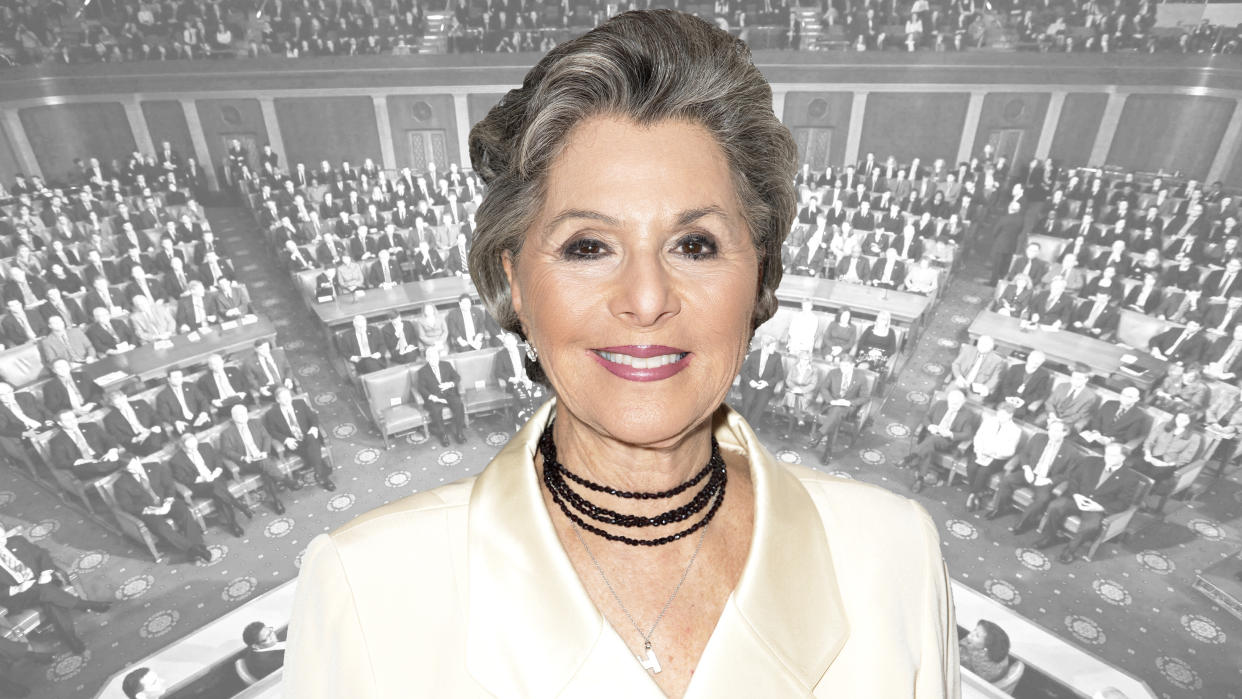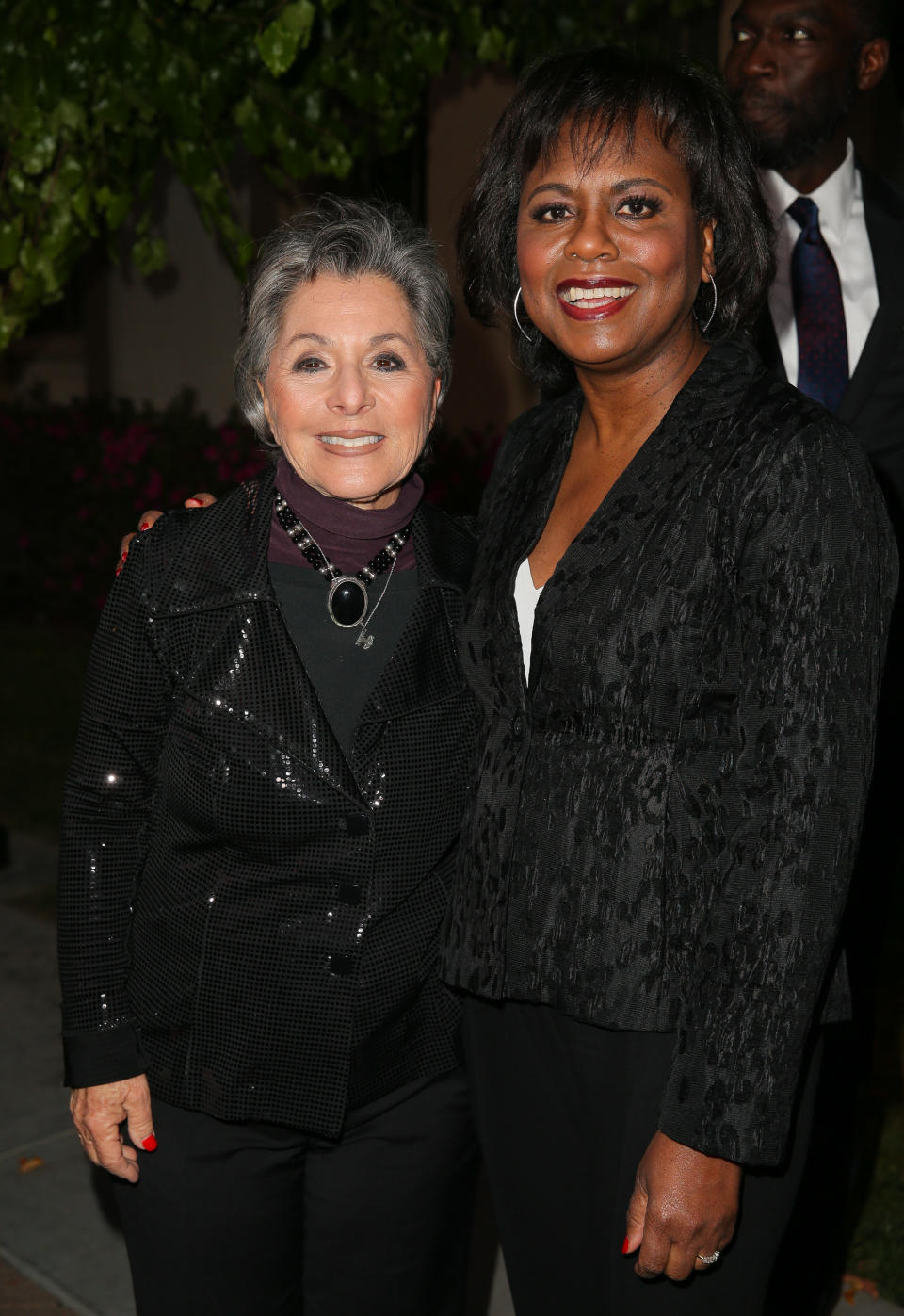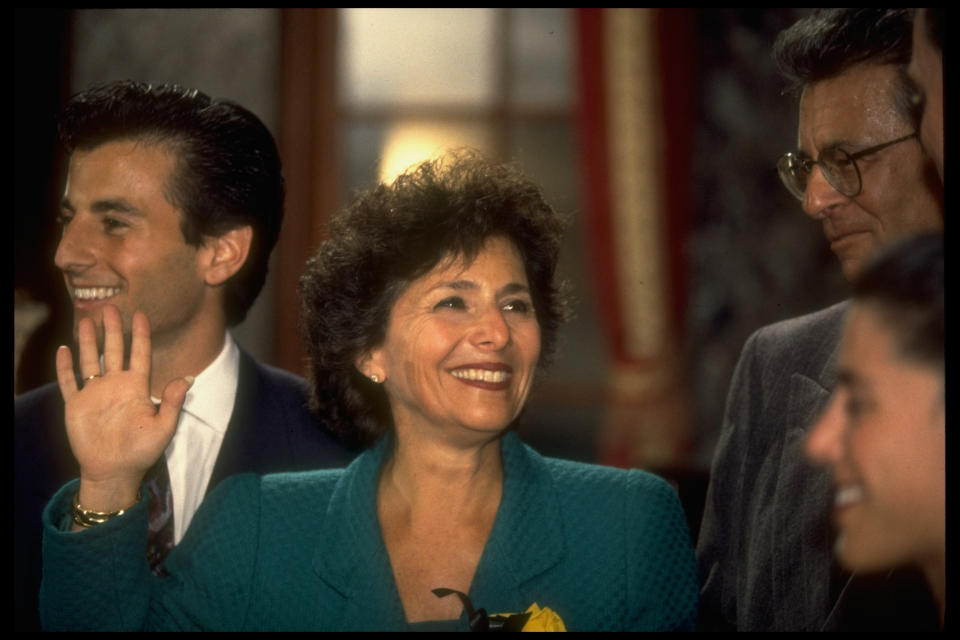Senator Barbara Boxer: The Exit Interview

After 40 years in public service and over 30 years in Congress, Sen. Barbara Boxer, D-Calif., is stepping down from the Senate. Boxer, the third most senior woman in the Senate, leaves behind a legacy of championing women’s causes: She entered public office in 1976, when she became the Marin County Board of Supervisors’ first woman president. She was elected to the House of Representatives in 1982, and in 1991, she and six other congresswomen demanded that the all-white, all-male Senate Judiciary Committee hold a hearing for Anita Hill’s sexual harassment allegations against Clarence Thomas. The hearings prompted a national conversation on sexual harassment against women in the workplace and ushered in a record number of women to the House and Senate. She helped lead the fight to pass the Violence Against Women Act, cosponsored the Lilly Ledbetter Fair Pay Act, introduced legislation to combat college campus and military sexual assault, and consistently received high ratings from both Planned Parenthood and NARAL for her pro-choice positions. California Attorney General Kamala Harris will take Boxer’s seat, becoming both the first Indian-American woman and the second black woman to ever serve in the Senate (Harris is biracial). In an exclusive exit interview with Cosmopolitan.com, Boxer reflects on her career, the state of women in politics today, and her concerns with a Trump presidency.
You often credit Anita Hill for your 1992 election to the Senate, which was labeled "The Year of the Woman." In 2016, the public saw how Donald Trump treats women, and though many were appalled, he was elected anyway. What, in your opinion, does this say about the political and social status of women in 2016 or the progress that women have made since 1992?
I take great solace in the fact that Donald Trump lost the popular vote. Hillary Clinton got over 2.5 million more votes than Donald Trump got. So I can’t say in any way that the people think that harassing women is appropriate. So I don’t think we should read into his victory the fact that, you know, women’s rights are going to be diminished.
What is clear is it is very disappointing that we didn’t win this election. We should’ve won it. We got more votes, but we didn’t get them in the right states. This is an issue that needs to be addressed. So I don’t take from this election a rejection of women, particularly since we had huge numbers of women elected nationwide: We got a woman to replace me in my seat, a woman to replace Harry Reid in his seat, we had a progressive woman replace a conservative woman in New Hampshire, and we got an incredible woman in Illinois to replace a man. I cannot take from this election the fact that women’s rights were rejected. I will not take that from this election.

Do you think that America will have a female president in your lifetime, and if so, who are the women you think are best poised to break the glass ceiling?
I don’t know how long I’m going to live, but I hope my genes are pretty good. So I can’t predict if I will see a woman president, but I think I may well because, again, Hillary got more votes probably than any other Democratic candidate ever, except for Obama. But she got more votes than Trump and she got more votes than Richard Nixon got when he won the election, more votes than John Kennedy got when he won.
So, yeah, I think it’s coming. I don’t want to go through the list of who it could be because there’s so many women. I’m not going to start that game at all. But I am saying there are women in the Senate, there are women in governorships, there are women in statewide office, there are women in the House, and I do think we can’t ignore the fact that we have had the first woman ever win a nomination of a major party and the first woman ever winning the popular vote. So I think the table is set for a woman in the near future. I really do.
You’ve initiated legislation, again, to dismantle the Electoral College. What do you think of the recount effort and the effort to petition Electoral College voters to abandon Trump?
Well, my understanding of the Electoral College is that they have the right to vote for who they want. So they should vote their conscience, and if their conscience leads them that way, they should follow their conscience.
My question is more about, are these efforts worth pursuing for Democrats: the recount and trying to petition Electoral College voters to sway-
I don’t think the recount’s about Democrats; it’s actually being pushed by the Green Party. I believe it should be done because there were so many close votes in those states. So, yes, I support the recount for sure.

You have been in public service for 40 years. What does it mean to you to be leaving right now at such a crossroads in American history?
I think what I focus on is the fact that I’ve been there for so many crossroads in American history. My whole political life spans the birth of the environmental movement, the women’s movement, the civil rights movement, putting an end to unjust wars, and so and so. Let me tell you, life is interesting regardless of when you are in the fight.
But the main thing I’m going to say is I’m not leaving the fight just because I decided not to run. I’m going to expand my political action committee and volunteer for it. I’m going to do lots of other things where I will have a voice. So I’m not leaving the fight.
Reflecting back on your time in Congress, how does this moment of turbulence rank in terms of some of the more difficult times that you’ve faced? Is there something really different about this or is this just like any other crossroads that you’ve seen?
Each crossroads is different, and this one, it presents us with a president-elect who’s never held public office, who’s never really dealt with national issues, whose views seem to be more narcissistic than realistic, and I think this is very unusual. I think it’s going to mean we have to be vigilant. Some of the things he’s said are outrageous. We don’t know if he’s going to go in those directions. So I think, yes, absolutely, your question is very justified. I think this is very different, and it’s going to mean every single American has to speak up, whether they voted for him or they did not vote for him. We have to treasure our country, our freedom, the progress we’ve made, and if we see any of that threatened, we have to respond.
Now, there are many ways to respond. The best way that I’ve always responded is through the electoral process, and in two years, the entire House of Representatives is up, a third of the Senate is up, so I will certainly be focusing on that as part of what I focus on.
One of the unique challenges that both lawmakers and people in my profession, for example, are going to have is the increase and spread of misinformation and fake news. What can be done to combat the spread of fake news and misinformation?
I think sites like Facebook ought to have to deal with this head-on. If something is opinion, put it in the opinion section: Don’t put it in the facts section. I was a reporter at one time in my life, and boy, you’re absolutely right. I mean, if you dared to put your opinion into a factual piece, your editors said, “You can’t do this. Write an op-ed.”
So I think we need to get back to truth-based news. It won’t be easy, but we better do it because otherwise we’re not acting on information. So I think all of these outlets have to be clear when something’s an opinion. Let it be marked. So there has to a certain responsibility, whether it’s TV news, online news, to sort out opinion from fact.

What do you think about the rise of Breitbart, which went from being a site that was out of the mainstream and now is very prominent as [former executive chairman] Steve Bannon is a chief strategist for Trump?
Well, first of all, I think we have to stop using the expression “alt-right.” It’s ridiculous. It’s racist, fascist, nationalist. I believe in truth-telling. So let’s call it what it is. It’s very troubling to see people like Bannon who make anti-Semitic remarks, who has a very checkered past be sitting next to the president of the United States. It puts an absolute responsibility on all of us to call it the way we see it and not use expressions like “alt-right.” If it’s racist, it’s racist. If it’s anti-Semitic, it’s anti-Semitic. If it’s anti-women, it’s anti-women. If it’s anti-immigrant, it’s anti-immigrant, and we need to really strengthen our language, so that it is clear and not mushy.
So would you say that reporters have a distinct responsibility here to be using those words and those descriptors in their reporting?
In my opinion, absolutely. And if you need to make the case as to why, go to the dictionary definition of these things and not sugar-coated in any way, shape, or form. If ever was a time to tell truth to power, it is now.
I am very enamored with the free press, and I was part of it for a period of time. And even though the press at times made me completely crazy as they followed me around the hall, and asked tough questions over and over again - now believe me, every politician feels this way - it is a necessary part of our life, and we must have a press that isn’t cowed and won’t be afraid of ratings if they get put to the back of the room at a press conference. The press is critical at this time, and if you look at history, this is so critical.
When you have a president-elect who calls the press every name in the book, I think it’s a warning shot across the bow, and you go back to what you learn when you were a child. You stand up to bullies. Don’t shrink back. You fight back with all your strength, and the press is going to have to do it, politicians are going to have to do it, all of us are going to have to do it.
Some intellectuals fear that Trump’s administration has the power to turn America’s democracy into an autocracy. Do you see that potential, or is that an alarmist position?
Well, nothing is alarmist with this guy because you don’t really know what he’s going to do. We haven’t got a clue because he’s never held a day in public office. If you look at what he did with Carrier - he said, “We’re going to keep all these businesses here because we’re going to hit them with 35 percent tariffs,” and what does he do? He gets his friend Mike Pence to pay them off with millions of dollars to stay there. Fine, you want to do that as a policy? Let’s debate it.
But he says one thing and then he, in this case, does a completely other thing and uses taxpayer money. And what I find amusing is this is a man you don’t even know if he’s ever paid a penny of federal tax, but he seems very willing to throw it around.
So I think being prepared for anything is the way to go. Who knows when he’ll have a press conference? Maybe he’s just going to stay in Trump Tower and issue tweets - you know, gold-plated tweets to the American people. It’s scary.

You have lost branches of your family in the Holocaust and Donald Trump’s proposed Muslim registry is prompting some to draw comparisons to the Holocaust. Jews are facing a rise in anti-Semitism. Have you had conversations with your family about Trump in the context of the Holocaust? Do you think that such comparisons are valid?
Unfortunately, Trump has showed hateful inclinations toward many, many groups. Many groups. The most obvious: undocumented immigrants and Muslims. His comments that I’ve seen that he’s made about Jewish people, about black people - they’re all very troubling to me - even though he sort of said, "Oh, I distance myself from hate and don’t do any of this hating stuff."
The fact of the matter is actions speak louder than words, and in many cases, his actions in the past toward blacks when he kept them out of his housing project, and his policies toward many groups [are] very, very troubling. And his comments about disabled people, about Mexicans, people of Mexican heritage, are all very, very troubling - and against women and about the way he views women. And we are seeing in schools and other places across this country young people acting out in hateful ways. So we need to be very, very vigilant on that. Now, in terms of my own family, our concerns run deep for every minority group, every minority religion.
Have you sat down to write to, or talk to, Hillary Clinton yet?
I have written to her, yes. And I hope to talk to her in the near future.
Can you disclose any of the things that you’ve written about or want to talk to her about?
No. That’s personal.

What’s one piece of advice that you would want to pass on to Kamala Harris as she prepares to take your seat in the senate?
I have told her in many ways - different ways - that she should come into this office filled with confidence and not being afraid to fight the good fight every single day. That’s the key.
You have said before that a long time ago when you lost a local election, you read an article by Gloria Steinem that really picked you up. I’m wondering if you’re reading anything right now that has had a similar effect on you.
Actually I’m writing about it myself now because I think I’ve gone through so many of these stages of defeat and loss and victory, the ups and downs, that I know how to handle it. I wrote a book called The Art of Tough and this book is straight from my heart and I just wrote it a few months ago. And it kind of lays out the way you get through these things. There’s nine rules of how you get through it. It’s very important to face the grief, face the anger, and then get into a place where you are ready to fight because if you go back to the history of the United States of America, our Founders said we’re giving you a Republic if you can keep it, and they also said we have a Constitution and we’re going to form a more perfect union. That means that the job is never done and every generation has to fight again. And so you take what you’ve learned, you pass it down, and you keep working. I don’t need to read anything actually at this point in my life. I think I’m able to write about it, and I know what to do, and I’ve done all the things I’ve told you. I’ve faced the grief, I’ve faced the anger, and I’m ready to keep up the fight because this country is worth fighting for.
Correction: An earlier version of this article misquoted Senator Boxer as saying, "I hope my seeds are pretty good." She said, "I hope my genes are pretty good." This has been corrected.
Follow Prachi on Twitter.
You Might Also Like

